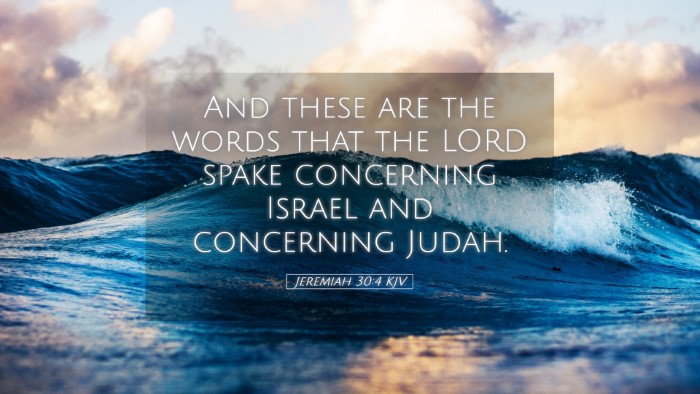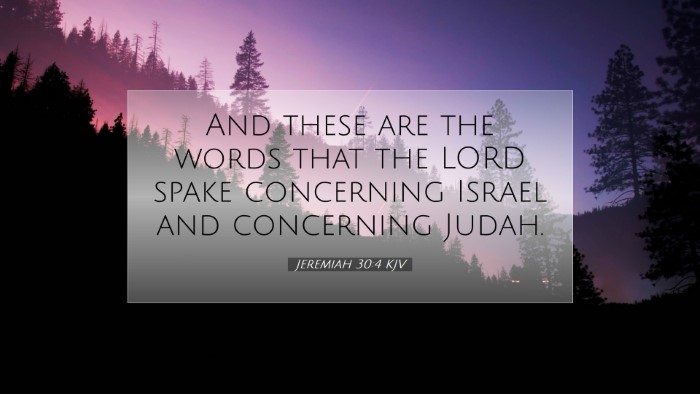Commentary on Jeremiah 30:4
Jeremiah 30:4 states:
"And these are the words that the Lord spake concerning Israel and concerning Judah."
This verse serves as an introduction to a significant prophetic message that underscores the themes of both judgment and restoration. The following commentary synthesizes insights from public domain theologians such as Matthew Henry, Albert Barnes, and Adam Clarke.
Contextual Background
The Book of Jeremiah is situated in a tumultuous period of Israel’s history, marked by the Babylonian exile and the impending destruction of Jerusalem. Jeremiah, often called the "weeping prophet," delivers a blend of warnings against sin, assurances of God’s fidelity, and prophecies of future hope.
The Significance of "Words of the Lord"
Matthew Henry emphasizes the authority and gravity of the words being spoken. The designation "these are the words that the Lord spake" indicates the divine origin of the message. It transitions the reader's focus from human interpretation to divine revelation.
Albert Barnes notes that this phrase serves to authenticate the message to Israel and Judah, reaffirming that it comes from Yahweh, which is critical as the people face a crisis of identity and faith under foreign domination.
Concerning Israel and Judah
This verse specifically addresses both Israel and Judah, indicating inclusivity in God’s message.
- Historical Context: Israel refers to the northern kingdom, which fell to Assyria, while Judah denotes the southern kingdom, still in existence at the time of this prophecy.
- Spiritual Import: This dual focus signifies that God's plans encompass all His chosen people despite their sociopolitical divisions.
- Theological Implications: The mention of both kingdoms reflects God's unwavering covenant relationship with His people, even amidst their disobedience and suffering.
Thematic Exploration
Adam Clarke elaborates on the themes of hope and restoration woven throughout Jeremiah's messages. The acknowledgment of both Israel and Judah sets the stage for the discussion of their future restoration, emphasizing God's merciful character.
Judgment and Hope
The preceding chapters in Jeremiah highlight the judgment coming due to Israel's continued disobedience. Nevertheless, this verse corresponds with God’s purpose to redeem and restore His people, as indicated in subsequent verses within this chapter.
- Judgment: The context of the message involves the consequences of sin, yet even in judgment, God’s message is not one of total despair.
- Reassurance of Restoration: The mere act of speaking about both kingdoms signifies God's intent to reconcile and restore those who repent.
The Importance of Prophecy
This prophecy not only serves as a warning but also as a declaration of God’s sovereignty over history. Matthew Henry argues that the prophetic voice aims to awaken the people to their condition while providing a blueprint for hope. It teaches that God is active in His creation and committed to His promises.
In the Light of Fulfillment
Pastors and theologians can find great encouragement in the prophetic nature of the text, recognizing how many aspects of Jeremiah's prophecies found fulfillment in the New Testament through Jesus Christ and the establishment of the Church.
Conclusion
In Jeremiah 30:4, we encounter a foundational text that combines divine authority with a call to repentance and a promise of hope. This verse not only reflects on the past failures of Israel and Judah but ultimately reassures them of a future with God, guided by His steadfast love and faithfulness.
As leaders and scholars study this passage, they are reminded of the overarching message of restoration that resounds not just through the book of Jeremiah but throughout Scripture, culminating in the reconciliation made possible in Christ.


